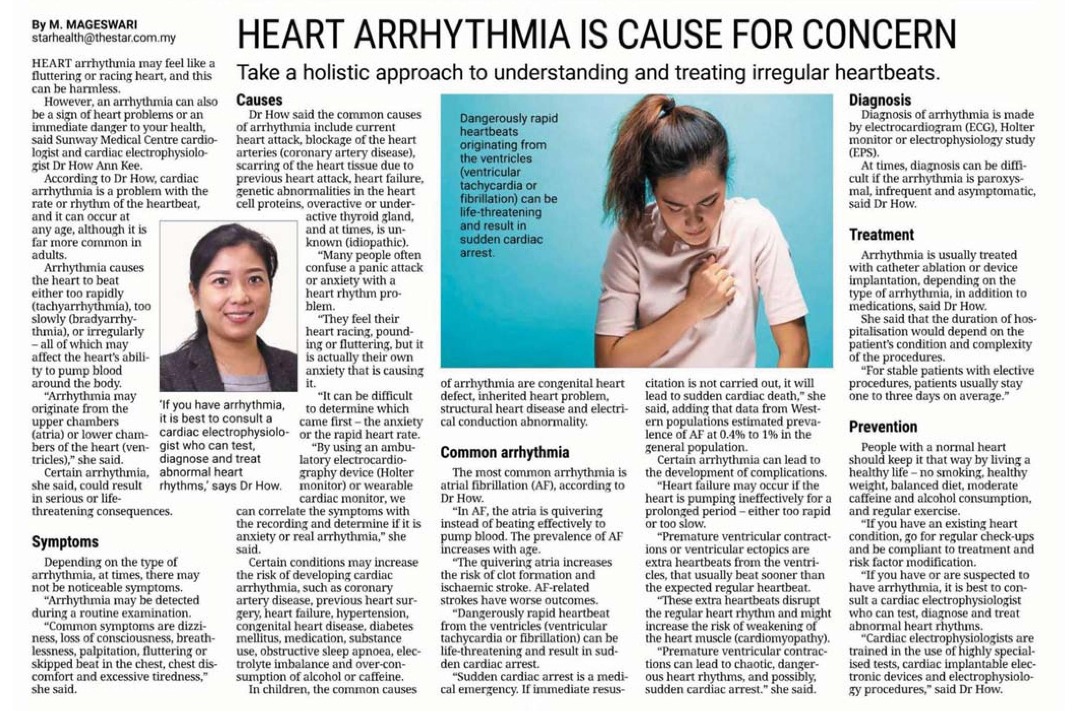Heart Arrhythmia is Cause for Concern
22 August 2021

Heart arrhythmia may feel like a fluttering or racing heart and this can be harmless.
However, an arrhythmia can also be a sign of heart problems or an immediate danger to your health, said Sunway Medical Centre cardiologist and cardiac electrophysiologist, Dr How Ann Kee.
According to Dr How, cardiac arrhythmia is a problem with the rate or rhythm of the heartbeat, and that it could occur at any age although it is far more common in adults.
Arrhythmia causes the heart to beat either too rapidly (tachyarrhythmia), too slowly (bradyarrhythmia), or irregularly – all of which may affect the heart’s ability to pump blood around the body.
“Arrhythmia may originate from the upper chambers (atria) or lower chambers of the heart (ventricles),” she said.
Certain arrhythmia, she said, could result in serious or life-threatening consequences.
Symptoms
Depending on the type of arrhythmia, at times there may not be noticeable symptoms.
“Arrhythmia may be detected during a routine examination. Common symptoms are dizziness, loss of consciousness, breathlessness, palpitation, fluttering or skipped beat in the chest, chest discomfort and excessive tiredness,” she said.
Causes
Dr How said the common causes of arrhythmia included current heart attack, blockage of the heart arteries (coronary artery disease), scarring of the heart tissue due to previous heart attack, heart failure, genetic abnormalities in the heart cell proteins, overactive or underactive thyroid gland and at times idiopathic (unknown cause).
“Many people often confuse panic attack or anxiety with a heart rhythm problem. They feel their heart racing, pounding or fluttering, but it is actually their own anxiety that is causing it.
“It can be difficult to determine which came first – the anxiety or the rapid heart rate.
“By using an ambulatory electrocardiography device (Holter monitor) or wearable cardiac monitor, we can correlate the symptoms with the recording and determine if it is anxiety or real arrhythmia,” she said.
Certain conditions may increase the risk of developing cardiac arrhythmia, such as coronary artery disease, previous heart surgery, heart failure, hypertension, congenital heart disease, diabetes mellitus, medication, substance use, obstructive sleep apnoea, electrolyte imbalance and over-consumption of alcohol or caffeine.
In children, the common causes of arrhythmia are congenital heart defect, inherited heart problem, structural heart disease and electrical conduction abnormality.
Common arrhythmia
The most common arrhythmia of irregular heartbeat is atrial fibrillation (AF), according to Dr How.
“In AF, the atria is quivering instead of beating effectively to pump blood. The prevalence of AF increases with age.
“The quivering atria increases the risk of clot formation and ischemic stroke. AF-related strokes have worse outcomes.
“Dangerously rapid heartbeat from the ventricles (ventricular tachycardia or fibrillation) can be life-threatening and result in sudden cardiac arrest.
“Sudden cardiac arrest is a medical emergency. If immediate resuscitation is not carried out, it will lead to sudden cardiac death,” she said, adding that data from Western populations estimated prevalence of AF is 0.4% to 1% in the general population.
Certain arrhythmia can lead to the development of complications.
“Heart failure may occur if the heart is pumping ineffectively for a prolonged period – either too rapid or too slow.
“Premature ventricular contractions or ventricular ectopics are extra heartbeats from the ventricles, that usually beat sooner than the expected regular heartbeat.
“These extra heartbeats disrupt the regular heart rhythm and might increase the risk of weakening of the heart muscle (cardiomyopathy).
“Premature ventricular contractions can lead to chaotic, dangerous heart rhythms and possibly sudden cardiac arrest.” she said.
Diagnosis
Diagnosis of arrhythmia is made by electrocardiogram (ECG), Holter monitor or electrophysiology study (EPS).
At times, diagnosis can be difficult if the arrhythmia is paroxysmal, infrequent and asymptomatic, said Dr How.
Treatment
Arrhythmia is usually treated with catheter ablation or device implantation, depending on the type of arrhythmia in adjunct to medications, said Dr How.
She said that the duration of hospitalisation would depend on the patient’s condition and complexity of the procedures.
“For stable patients with elective procedures, patients usually stay one to three days on average.”
Prevention
People with a normal heart should keep it that way by living a healthy life – no smoking, healthy weight, balanced diet, moderate caffeine and alcohol consumption, and regular exercise.
“If you have an existing heart condition, go for regular check-ups compliant to treatment and risk factors modification.
“If you have or are suspected to have arrhythmia, it is best to consult a cardiac electrophysiologist who can test, diagnose and treat abnormal heart rhythms.
“Cardiac electrophysiologists are trained in the use of highly specialised tests, cardiac implantable electronic devices and electrophysiology procedures,” said Dr How.
Source: The Star
Back


